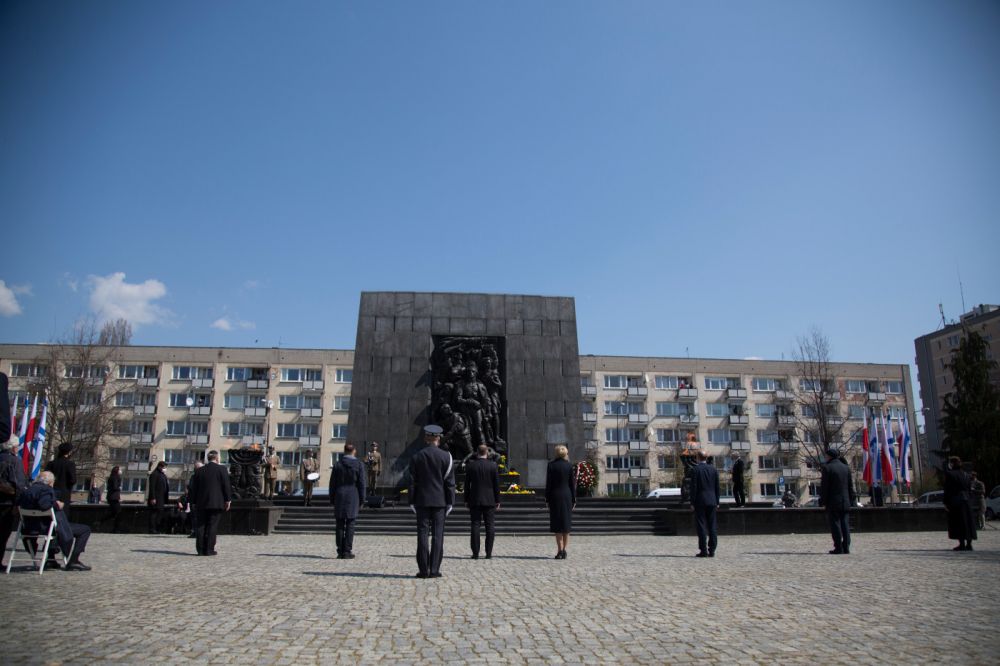- News
- Events
- Oneg Shabbat
- Collections
- Research
- Exhibitions
- Education
- Publishing Department
- Genealogy
- About the Institute
- Bookstore


Before the Monument to the Ghetto Heroes. Photo by Maja Nowak, Warsaw Ghetto Museum
The celebrations of the 78th anniversary of the Warsaw Ghetto Uprising began with the song Zog nit keyn mol, az du geyst dem letstn veg [Don't say it's time to go the last way] which Hirsz Glik, a prisoner of the Vilnius ghetto, wrote in May 1943 on the news of the Warsaw ghetto uprising. The participants commemorated the leaders and soldiers of the Jewish Combat Organization – Mordechaj Anielewicz, Icchak Cukierman, Cywia Lubetkin, Marek Edelman – and the Jewish Military Union – Paweł Frenkel, Leon Rodal, Dawid Wdowiński, Ziuta Hartman – and all the victims of the Warsaw Ghetto.
The Chief Rabbi of Poland, Michael Schudrich, recited the Kaddish – prayer for the dead. Then Aleksandra Idkowska sang the songs Warszawo ma [My Warsaw] by Andrzej Włast and Kontratak [Counterattack] by Władysław Szlengel.
See the video of the ceremony on YouTube
Wreaths at the Monument to the Ghetto Heroes were laid by:
President of the Republic of Poland Andrzej Duda and his wife Agata Kornhauser-Duda
President of the Social and Cultural Society of Jews in Poland, Artur Hofman
Director of the Warsaw Ghetto Museum, Albert Stankowski
Director of the Jewish Historical Institute, Monika Krawczyk
on behalf of the Minister of National Defense, commander of the Warsaw garrison, Major General Robert Głąb
Photos by Maja Nowak, Warsaw Ghetto Museum
After the official ceremony, the President of the Republic of Poland Andrzej Duda emphasized that the participants of the uprising could not count on the possibility of capitulation. They knew that they would not be treated by the Germans like soldiers.
– They fought heroically, fought like lions, fought to the very end, very often to the horror of German Nazi soldiers – the President added: – It was the moment that Polish Jews, Poles of Jewish origin, had been waiting for from the very beginning of the war.
– They were one of us, it was our uprising. Someone will say: "our Jews", but they were one of us – said the President.
Władysław Szlengel
Counterattack [fragment]
Hear, O German God,
How the Jews, in the "wild" houses pray,
Clenching in the fist a stick, a stone.
We beg you, O God, for a bloody battle,
We implore you for a violent death,
Let our eyes not see, before we expire,
The stretch of the train tracks,
But let the precise aim of our hand, O Lord,
Stain their livid uniforms with blood,
Let us see, before the mute groan
Shreds our throats,
Our simple human fear in their
Haughty hands, in their whip-wielding paws.
From Niska, Miła, and Muranowska Streets,
Like scarlet flowers of blood,
Sprout the flames of our gunbarrels.
This is our Spring! Our Counterattack!
The intoxication of our battle!
These are our partisan forests:
The alleys of Dzika and Ostrowska Streets.
"Block" numbers quiver on breasts,
Medals of the Jewish war.
The cry of six letters flashes in red,
Like a battering ram bellows the word: REVOLT
Hirsz Glik was born in 1922 in Vilnius. He was a young poet, a prisoner of the Vilnius ghetto, in which on May 1, 1943, upon the news of the Warsaw Ghetto Uprising, he presented to his friends the song Zog nit keyn mol, az du geyst dem letstn veg [Don't say it's time to go the last way] , also known as Partisanen lid [Song of the Partisans]. This piece became one of the hymns of ghetto fighters and the songs of Holocaust survivors. Glik became a partisan himself and was probably murdered by the Germans in 1944.
Andrzej Włast was born Gustaw Baumritter in 1895 in Łódź. He was a poet, soldier of the 1st Brigade of the Polish Legions during World War I, collaborator of theaters and cabarets in Warsaw, director of theaters. Murdered in 1942 or 1943 in the Warsaw ghetto.
Władysław Szlengel was born in Warsaw, probably in 1912. In the 1930s he became a popular songwriter, collaborator of Warsaw newspapers and cabarets, and an actor. After taking part in the 1939 defense of Warsaw, he became a poet of the Warsaw ghetto and collaborated with the Oneg Shabbat group collecting information about the life and extermination of Jews under German occupation. He was murdered or died in combat on May 8, 1943 during the Warsaw Ghetto Uprising.
Information about Hirsz Glik: Polski Słownik Judaistyczny [Polish Judaic Dictionary] (Rafał Żebrowski), portal „Wirtualny Sztetl” [Virtual Shtetl]; about Andrzej Włast: Cyfrowa Biblioteka Polskiej Piosenki [Digital Library of Polish Song]; about Władysław Szlengel – PSJ (Zofia Borzymińska), „Wirtualny Sztetl”. Fragment of the poem "Counterattack" by Władysław Szlengel translated by Frieda A. Aazon, http://info-poland.icm.edu.pl